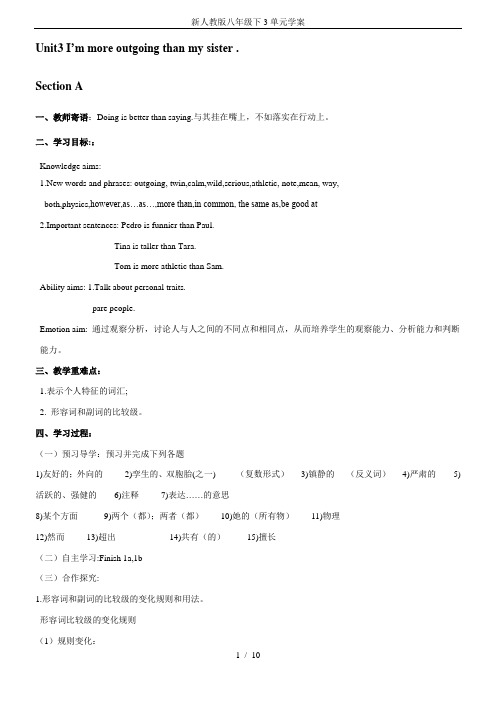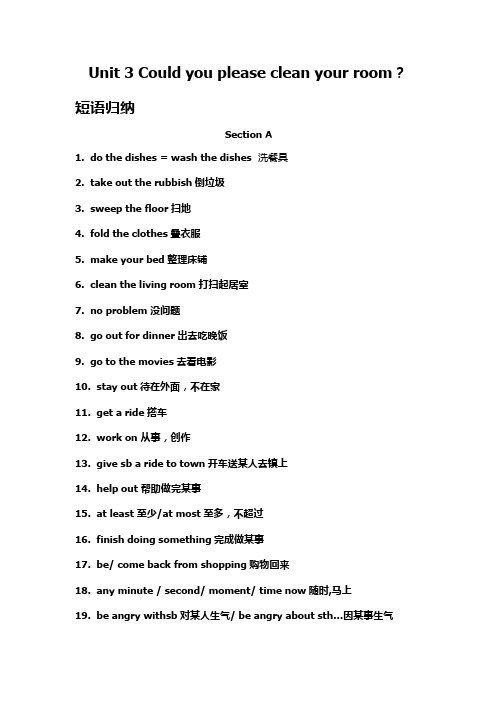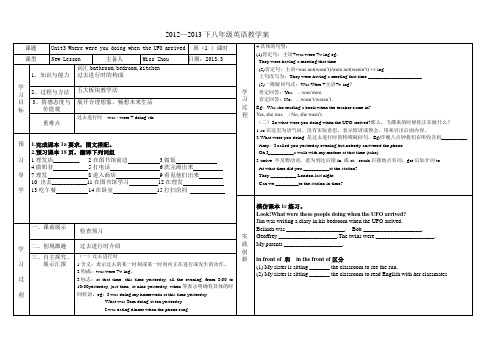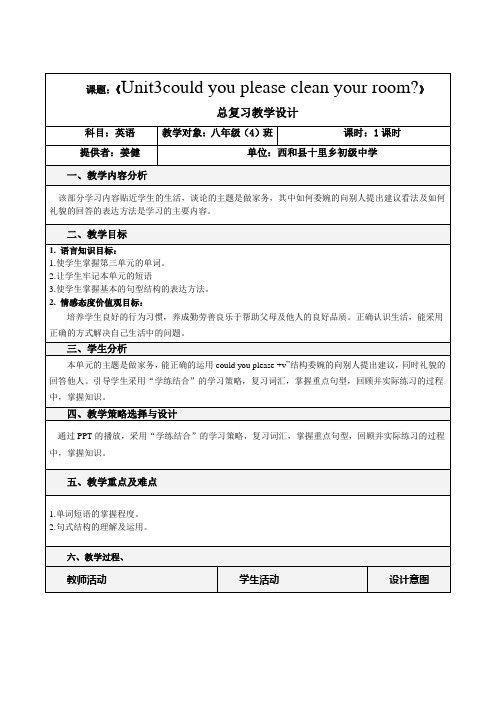2013新人教版八年级unit3复习学案
- 格式:doc
- 大小:34.00 KB
- 文档页数:2


Unit3 I’m more outgoing than my sister .Section A一、教师寄语:Doing is better than saying.与其挂在嘴上,不如落实在行动上。
二、学习目标::Knowledge aims:1.New words and phrases: outgoing, twin,calm,wild,serious,athletic, note,mean, way,both,physics,however,as…as…,more than,in common, the same as,be good at2.Important sentences: Pedro is funnier than Paul.Tina is taller than Tara.Tom is more athletic than Sam.Ability aims: 1.Talk about personal traits.pare people.Emotion aim: 通过观察分析,讨论人与人之间的不同点和相同点,从而培养学生的观察能力、分析能力和判断能力。
三、教学重难点:1.表示个人特征的词汇;2. 形容词和副词的比较级。
四、学习过程:(一)预习导学:预习并完成下列各题1)友好的;外向的_____2)孪生的、双胞胎(之一)_____(复数形式)___3)镇静的___(反义词)___4)严肃的____5)活跃的、强健的____6)注释_____7)表达……的意思______8)某个方面______9)两个(都);两者(都)____10)她的(所有物)____11)物理_____12)然而_____13)超出_____-----------14)共有(的)_____15)擅长_____(二)自主学习:Finish 1a,1b(三)合作探究:1.形容词和副词的比较级的变化规则和用法。

Unit 3 Could you please clean your room?短语归纳Section A1. do the dishes = wash the dishes洗餐具2. take out the rubbish倒垃圾3. sweep the floor扫地4. fold the clothes叠衣服5. make your bed整理床铺6. clean the living room打扫起居室7. no problem 没问题8. go out for dinner出去吃晚饭9. go to the movies去看电影10. stay out待在外面,不在家11. get a ride撘车12. work on 从事,创作13. give sb a ride to town开车送某人去镇上14. help out 帮助做完某事15. at least 至少/at most 至多,不超过16. finish doing something完成做某事17. be/ come back from shopping购物回来18. any minute / second/ moment/ time now随时,马上19. be angry withsb对某人生气/ be angry about sth…因某事生气20. throw down 扔下/throw away 扔掉21. solve the problem解决问题22. the minute……/ as soon as… / the moment …一…….就……23. sit down 坐下24. in front of …在…..前面25. come over 过来,顺便来访26. take the dog for a walk= take a walk with …遛狗27. all the time一直 ,反复 all day一整天 all evening整晚28. as…as…与……一样……29.neither …nor… 既不…也不…30. in surprise吃惊地,惊讶地31. as soon as 一……就……32. share the housework分担家务 /share sth with sb .和某人分享某物33. hang out闲逛 hang up 把......悬挂/挂起34. pass sb sth= pass sth to sb把某物递给某人 Pass on 传递35. borrow sth from sb 从某人那里借某物36. lend sth to sb = lend sb sth 把某物借给某人37. hate to do / doing sth讨厌做……38. try (not) to do sth努力(不)做某事。


Unit 3 I am more outgoing than my sister?Revision教学设计ⅠAnalysis of the teaching materialThis part is mainly about personal traits and how to compare people.ⅡAnalysis of the teaching aimsⅢTeaching key and difficult pointsing different dimensions to introduce and compare friendsing comparative to discuss and compare character characteristics.ⅣTeaching aids: SeewoⅤTeaching methods: Situational approach, task-based approach, inspirational teachingⅥTeaching procedure(标注中ABC分别代表不同层次的学生,A层较好,B层中等,C层为学困生) TeachingprocedureTeacher’s activities Ss’s activities purposeStep 1Lead-in(ABC)1.Greeting and show thelearning objectives2.A brief introductionabout Xiong Chumo3.Let Ss chant and playgames1.Read and know thelearning objectives2.Watch a short videoabout Xiong Chumo3.Chant and play games1.To introduce the maincharacter of this class andcreate a situation of this class2.Review the rules for thecomparative change ofadjectives and adverbStep 2 Presentation (AB)Present a question and listthe dimensions ofintroducing a friendThink and answer thequestionsEnable students to have acomprehensive understandingof the dimensions ofintroducing friendsStep 3 Appearance (ABC)Present a picture ofXiong Da, Xiong Er andGuang Touqiang and aska questionDescribe and compare twocharacters of the three inappearancePractice positive degree andcomparative sentencestructuresStep 4 Personality (AB)Show some pictures andpresent a questionDescribe and compare twocharacters of the three inpersonalityReview and practice positivedegree and comparativesentence structuresStep 5 Ability (AB)Show some pictures andphrases, present aquestionDescribe and compare twocharacters of the three inabilityTo help Ss understand thedifferences among peopleStep 6 Ask them to do some Discuss and share the Further expansion of theⅦ。

人教版八年级英语上册 Unit 3 复习教案教学目标:1. 复习并掌握本单元的重点词汇和短语。
2. 复习并掌握本单元的重点语法知识。
3. 提高学生的听、说、读、写能力。
教学准备:教材、课件、多媒体设备、单词卡片、图片等。
教学过程:Step 1: Warm-up1. Greetings.2. Review the vocabulary from Unit3. Divide the class into two groups and have a vocabulary competition. The teacher shows a picture or describes a word, and the students from each group race to say the word first. The group with the most correct answers wins.Step 2: Vocabulary Review1. Review the vocabulary words from Unit 3. Show the word cards one by one and ask students to say the words and give the meanings.2. Play a game of "Guess the Word" to review the vocabulary. The teacher describes a word and the students have to guess what it is.Step 3: Grammar Review1. Review the present continuous tense. Use examples and pictures to elicit the rules of forming and using the present continuous tense.2. Give students a worksheet with sentences in the present continuous tense. Have them complete the sentences by filling in the correct form of the verb in brackets.3. Play a game of "What are they doing?" Show pictures of different activities and ask students to describe what the people are doing using the present continuous tense.Step 4: Listening and Speaking Practice1. Play the recording of the dialogue from Unit 3 and have students listen and answer the questions.2. Pair students up and give them a topic to discuss using the present continuous tense. For example, "What are you doing after school today?" Have them take turns asking and answering questions using the present continuous tense.Step 5: Reading and Writing Practice1. Have students read the passage from Unit 3 and answer the comprehension questions.2. Ask students to write a short paragraph about what they are doing at the moment using the present continuous tense.Step 6: Consolidation1. Review the key points of Unit 3 and ask students if they have any questions.2. Summarize the main grammar points and vocabulary words from the unit.Step 7: Homework1. Assign homework exercises from the textbook or workbook to reinforce the grammar and vocabulary learned in Unit 3.2. Encourage students to practice using the present continuous tense in their daily life and write down what they are doing at different times of the day.教学反思:本节课通过复习本单元的重点词汇和语法知识,巩固学生对所学内容的掌握。
基于课程标准Unit 3 Could you please clean your room?导学案【课程标准相关陈述】1.能运用一些最常用的日常套语;2.能听懂接近正常语速、熟悉话题的语段,识别主题,获取主要信息;3.能在口头表达中做到发音清楚,语调基本达意;4. 了解和运用表示请求这一交际功能的基本表达形式;5.能在小组活动中积极与他人合作,相互帮助,共同完成学习任务。
【复习目标】1. 掌握重点单词、短语及句型,并灵活运用。
2. 学会有礼貌地提出要求和请求准许。
3. 主动地去帮助家人做杂务。
4. 学会照顾自己,培养自己的独立意识。
【复习重难点】情态动词could的用法。
【复习过程】复习案一、单词过关:课本P117 rubbish ------ P118 unfair二、短语归纳:1. 洗餐具do the wishes2. 倒垃圾take out the rubbish3. 出去go out4. 待在外面,不在家stay out5. 帮助做完某事help out6. 至少at least7. 扔下throw down8. 频繁,反复all the time9. 惊讶地in surprise 10. 一……就……as soon as 11. 在……花费(时间或金钱)spend…on…12. 为了in order to 13. 向某人提供某物offer sb. sth./ offer sth. to sb./ provide sb. with sth./ provide sth. for sb. 14. 依赖,信赖,视……而定,取决于depend on 15. 照顾,照看look after/ take care of16. 保持它干净和整洁keep it clean and tidy 17. 进入get into 18. 结果as a result三、用法集萃:1. 做完某事finish doing sth.2. 想要某人做某事want sb. to do sth.3. 尽力(不)做某事try (not) to do sth.4. 让某人做某事let sb. do sth.5. 做某事花费……时间/ 金钱spend some time/ money (in) doing sth.6. 介意做某事mind doing sth.7. 学会做某事learn to do sth.8. 学会怎样做某事learn how to do sth.9. 越……,越……the +比较级,the +比较级10. 需要做某事need to do sth.探究案语法专项:情态动词could的用法:1. 本单元中,情态动词could的用法:用于有礼貌地提出要求或请求准许,用于疑问句,代替can,在时间上与can没有区别,但语气要比can委婉、有礼貌。
进门测试1.How can we practice our spoken English??The first and the most important thing is to believe (1) (you) . You should always be full (2) confidence or you will never be able to improve your English.You should often encourage yourself." Come on, don't be afraid!"??You should never lose heart and never give up.?Maybe you are afraid of (3) (lose) face, but you should think since we are students andwe're?learning ,there's no need (4) (worry)?about anything. You must always be active in practice. There's no problem that your pronunciation and intonation (语调) can't be as good?as the native people (5)we are Chinese, and we don't have chances to live in English-speaking (6) (country) and talk with the people there?all the time .But you must know that the main aim to study English is that we make ourselves understood and (7) (understand) other people as well. You should believe that native speakers will not laugh at you.?instead they will encourage you. So (8) you are brave enough, you'll (9)(certain) make a rapid progress in your?spoken English.Don't?be shy. (10) (not) be afraid! Just have a try.?在家总是被老妈呼唤来呼唤去,要求你去帮忙做家务,今天自个儿来做一回老妈,想一想吩咐做家务可11/11。
Unit 3一.单词3________________v练习/n______________练习做某事6_______________adj/adv较好_____________adj好的__________adv好地_______________adj/adv最好7_______________adv安静地______________adj8_________________n比赛/竞争_______________v竞争/比赛___________________与.......竞争___________________________我们每个人都应该与自己竞争________________参加....比赛_______________________________他终于获得了参加奥运会的机会_________________为......而竞争_____________________我们为了第一名而竞争_______________n竞争者______________adj竞争激烈的______________________我们生活在一个竞争激烈的社会9________________adj极好的10________________pron/adj哪一个/哪一些11________________adv清楚地______________adj清楚的12________________v获胜_____________过去式______________n获胜者_________________赢得比赛______________赢得战争___________________赢得奖品_______________赢得金奖13_______________adv不过/可是/然而conj虽然/尽管_____________________________我们失败了,但是这也是一场不错的比赛=___________________________________14.________________adj有才能的/有天赋的__________________n________________在某方面/做某事有天赋=___________________他在音乐方面有天赋_________________________Peter在踢足球上有天赋15_______________adv真正/确实______________adj真的______________n事实_________________说实话_____________________________说实话,我并不喜欢弹吉他。
Unit 3 I’m more outgoing than my sister.
复习导学案
Come on, I can do best! 相信自己,一定要做最棒的!
【复习目标】
复习单元词汇和短语;掌握比较级形式的构成;巩固本单元的比较级用法;正确运用比较级对人物进行比较描述;
【复习重点难点】
1. 复习本单元的单词、短语及重要句子。
2. 复习巩固:
①形容词、副词的比较级规则变化和不规则变化。
②比较级的句型、特殊句型和修饰词。
③讨论个性特征,用比较级对人物进行描述。
3. 运用范文进行写作训练
【复习过程】
一.听写单词。
(同桌互批,小组①②号全对得2分,③④号全对得4分)
二.复习词组,自我检测。
(利用电子白板展示重要词组,老师带领着复习,然后小组抢答,答对者得1分)
三. 看图片,复习本节课的重点:
①熟记形容词和副词比较级的规则和不规则变化,背会口诀,并完成白板上
对应练习。
②练习并总结比较级句型:......比较级+ than +比较对象
③掌握比较级中的特殊句型:比较级+ and +比较级,表示“越来越···”;
The +比较级,the +比较级,表示“越···就越···”【当堂检测】
1)基础检测
按要求写出下列词的正确形式。
happy(比较级)_________ more athletic(原级)___________
funny(比较级)__________ delicious(比较级)_______
good(比较级)__________ thin(比较级)_________
big(比较级)___________ more outgoing(原级)______________
2)目标检测
1. I think Tara is ____________ than Lucy. (outgoing)
2. Tom is a little ____________ than Jim. (serious)
3. Lucy is much ____________ than Lily. (athletic)
4. Our school is becoming ____________________. ( beautiful)
5. This car is even ____________. (expensive)
6. Math is not so__________(difficult)as you think.
7. The more you eat, __________________ you are. (heavy)
3)能力提升
Susan是你的好朋友,按照下列提示,撰写文章。
对比你们相同和不同的地方(至少写三处)。
注意使用比较级及“the same as、a little、much、as…as、”等用于比较的词。
Hi,everyone,this is my friend—Susan.She is _________________________ _____________________________________________________________
_____________________________________________________________
_____________________________________________________________
_____________________________________________________________
_____________________________________________________
【我的收获】
这节课我复习了:
①
②
③
(你能大声地、一起说出来吗?)
课后反思:。